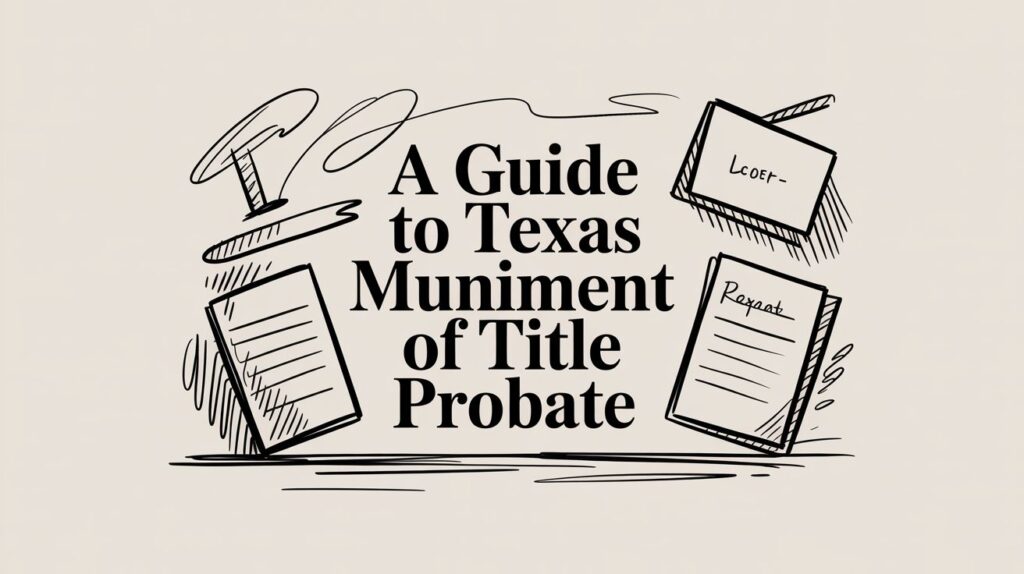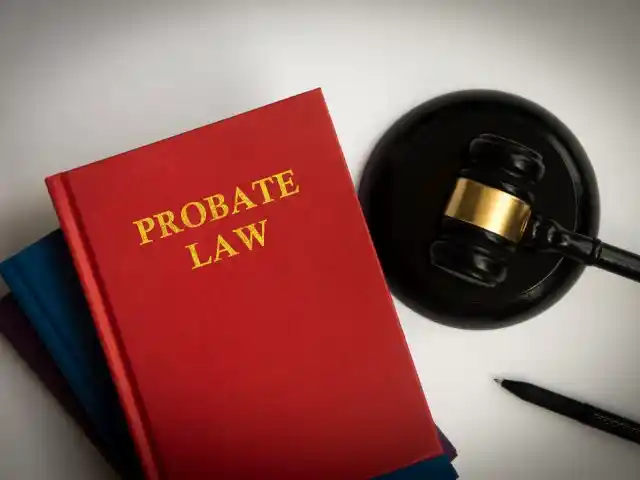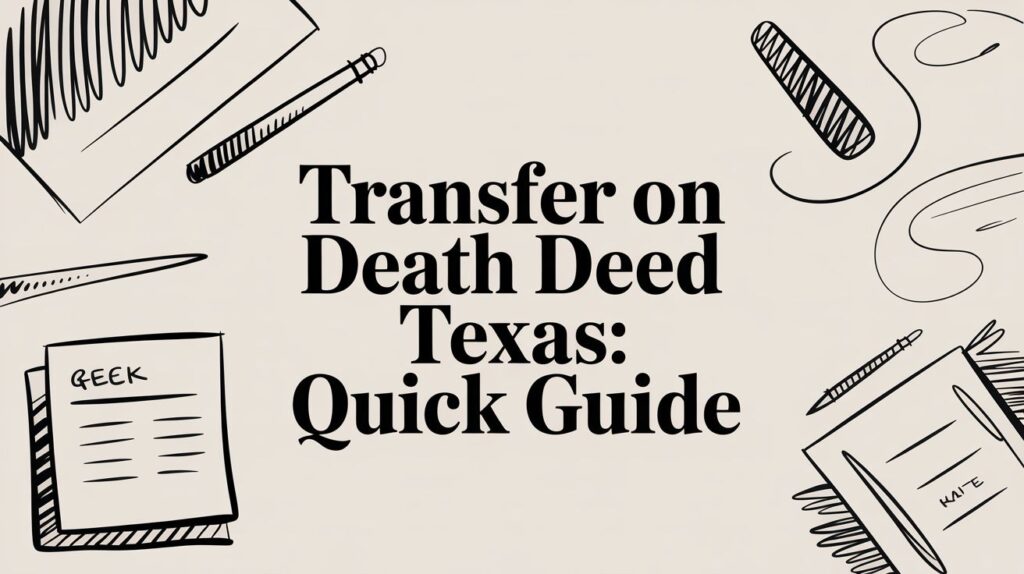If you’re searching for how to probate a small estate in Texas, chances are you’re navigating one of life’s toughest transitions—losing a loved one. Emotions run high, but paperwork, deadlines, and legal formalities don’t wait. And while the word “probate” may sound intimidating, Texas law actually offers several streamlined options for handling smaller estates.
This guide takes a storytelling and analytical approach to make things easier to understand. We’ll walk you through everything you need to know—requirements, timelines, common court forms, and what pitfalls to avoid—so you can confidently probate a small estate in Texas without unnecessary stress or delays.

What Does “Small Estate” Mean in Texas?
The term “small estate” is a legal classification. It doesn’t mean the process is informal or that there’s no paperwork involved—it simply means the estate qualifies for a simpler route through the Texas probate system.
Under Texas Estates Code Section 205, an estate is considered “small” if:
- The total value of the estate is $75,000 or less, excluding homestead and exempt property.
- The decedent died without a will (intestate).
- There is no pending or granted application for formal probate.
- The only real property (if any) is the decedent’s homestead.
If all of these apply, then the estate might qualify for a Small Estate Affidavit (SEA)—a simplified legal tool used to avoid the longer and more expensive probate process.
Real-Life Example: When the Paperwork Almost Took Longer Than the Grieving
Imagine this: Linda’s father passed away in El Paso with no will. He owned a small home (his homestead), an old truck, and around $8,000 in a bank account. No debts. Linda had never even heard of probate law, let alone how to probate a small estate in Texas. She almost paid a lawyer $4,000 to file for full probate—until someone at the clerk’s office mentioned the SEA.
A few signatures, an affidavit, and about a month later, Linda legally took possession of the property and funds—without going through a full probate hearing. That’s the value of knowing your options.
The Small Estate Affidavit: Your Primary Tool
When people ask how to probate a small estate in Texas, they’re usually referring to the Small Estate Affidavit. This document serves as both a summary of the estate and a legal instrument that can be presented to banks, financial institutions, and title offices to release funds or transfer ownership.

Key Requirements for the SEA
- The estate must be valued at $75,000 or less, excluding homestead and exempt assets.
- The deceased must not have left a valid will.
- No petition for the appointment of a personal representative can have been filed.
- The heirs must be identifiable according to Texas laws of intestate succession.
- All heirs and distributes must sign the affidavit.
- Debts (aside from mortgage on homestead) must be settled or manageable.
What Counts Toward the $75,000 Limit?
- Bank accounts
- Vehicles
- Personal property (furniture, electronics, etc.)
- Cash or checks owed to the deceased
What’s excluded?
- The homestead
- Exempt property, such as tools of trade or one vehicle
Understanding what qualifies is crucial—many families mistakenly assume they don’t qualify simply because a home is involved. But if that home was the deceased’s homestead, it’s excluded from the calculation.
How to Prepare a Small Estate Affidavit in Texas
Let’s get into the nuts and bolts of how to probate a small estate in Texas using a Small Estate Affidavit. The process is more straightforward than a full probate case, but it still requires attention to detail.
Step 1: Collect Necessary Information
You’ll need:
- The decedent’s death certificate
- A detailed list of all assets and debts
- Contact info for all heirs
- A clear family tree showing who inherits under Texas law
- Valuations (e.g., bank balances, car value, etc.)
- A copy of the deed if a homestead is involved
Step 2: Draft the Small Estate Affidavit
You can find the form online through your county’s probate court website, but make sure it meets the local court’s formatting rules. Each county may have slight variations.
The affidavit must include:
- A statement confirming no will exists
- A list of heirs
- A breakdown of assets and liabilities
- A request to transfer the estate to heirs
All heirs must sign and swear that the information is correct in front of a notary public.

Step 3: File the Affidavit With the Probate Court
Bring the affidavit to the probate clerk in the county where the decedent lived. You’ll pay a filing fee (usually $250–$400 depending on the county).
Some counties may require a court hearing, but many will approve the affidavit administratively—especially if it’s completed properly.
Step 4: Use the Approved Affidavit to Collect Assets
Once the affidavit is approved and time-stamped, you can present it to financial institutions or other third parties to collect money, transfer titles, or update property records.
When the Small Estate Affidavit Isn’t Enough
Sometimes, even if the estate seems small, the affidavit may not work—especially if there’s out-of-state property or heirs who won’t cooperate. In such cases, pursuing alternative probate routes becomes essential to avoid delays and legal complications.
Alternatives to the SEA:
Affidavit of Heirship: Used when there isreal estate involved and no will, but no formal probate is filed. It doesn’t transfer title but helps establish ownership over time. Title companies often require the affidavit to be on file for several years before honoring it for real estate transfers.
Muniment of Title: Used when there is a valid will, no debts (aside from mortgage), and you simply want to transfer title to property without opening an estate administration. It’s commonly used to transfer homestead property to heirs without appointing an executor.
Full Probate: If there are large debts, disputes among heirs, or unclear title issues, full probate may be necessary. This formal process ensures all assets and liabilities are fully addressed under court supervision.
Understanding how to probate a small estate in Texas means knowing when the small estate affidavit is the right tool—and when it’s not. A careful evaluation of the estate’s complexity can save time, stress, and money.
Deadlines You Shouldn’t Miss
While there’s no strict deadline to file a Small Estate Affidavit, timing does matter. Acting quickly helps preserve evidence, streamline asset access, and prevent misunderstandings among heirs or institutions.
Key Time Considerations:
Creditors have up to four years to file claims against the estate. Failing to resolve creditor issues early may lead to later disputes or estate reopening.
Bank accounts may become dormant or turned over to the state if left untouched for too long. Once this happens, recovering the funds involves additional paperwork through the Texas Comptroller’s unclaimed property process.
Heirs may lose access to records or physical assets over time if matters are not handled promptly. For example, storage units may be emptied, utilities cut off, or properties foreclosed without proper management.
It’s best to begin the process within 30 to 90 days of the person’s death, especially if urgent financial matters (like funeral costs or mortgage payments) need resolution. Early action not only honors the decedent’s wishes but also ensures smoother transitions for those left behind.
Court Forms You’ll Likely Need
Each Texas county may have its own version of the SEA form, but here are common documents to be prepared for:
- Small Estate Affidavit (SEA)
- Heirship Table
- Death Certificate
- Inventory of Assets and Liabilities
- Affidavit of No Will
- Affidavit of Heirship (if applicable)
Check your county’s probate court website for downloadable versions and filing instructions. Some courts even provide sample affidavits or templates to help guide you.

Real-World Example: When Probate Became a Family Dispute
When Raul passed away in Travis County, he left no will. His daughter assumed everything would pass to her—but his estranged son, whom he hadn’t spoken to in 20 years, still had legal rights under Texas succession laws.
The daughter filed a Small Estate Affidavit, but the son refused to sign. As a result, the affidavit was denied. They were forced into full probate, and the costs and delays skyrocketed.
Moral of the story? Even when you know how to probate a small estate in Texas, cooperation among heirs is often the key to making the process work.
Benefits of Using the Small Estate Affidavit Route
Why bother with the SEA? For starters:
- Saves time (weeks instead of months)
- Less expensive (no need for ongoing attorney fees)
- Reduces stress during an already emotional time
- Simplifies title transfers and access to funds
Especially in rural counties or for modest estates, the SEA often makes the most sense.
Final Thoughts: Mastering the Small Estate Probate Process in Texas
Understanding how to probate a small estate in Texas gives you the power to take control during a difficult chapter of life. It’s not always as simple as it seems—but it’s also not as complicated as you might fear. With the right documentation, clear communication, and attention to court rules, the Small Estate Affidavit can help resolve matters quickly and efficiently.
And remember: while an attorney can help, many small estate matters can be handled without one—as long as you understand the process and follow the requirements carefully. If you’re ever unsure, your local probate clerk can often provide guidance or direct you to local resources.
In the end, knowing your rights, your responsibilities, and your available tools isn’t just about probate—it’s about peace of mind. And that’s something every family deserves when saying goodbye to a loved one.








